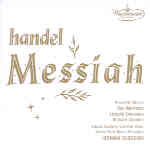Don’t expect orthodox interpretations from Hermann Scherchen. Do expect to see old standards through new lenses, as in this 1959 Messiah that for all its seemingly perverse moments has for decades been one of the most interesting, insightful, and enjoyable of the innumerable versions that have come down the pike. In Scherchen’s hands, Messiah is an overwhelmingly dramatic, even operatic work, concerned above all with expressive narrative drive, its lumbering portions setting up the full-charge-ahead ones or drawing you into deep introspection. In other words, this isn’t ye olde comfortable, plush Messiah of yore. It’s a modernist Messiah for our times, with the trappings of historical accuracy replaced by deep emotional expression.
There’s a nod to authenticity in Scherchen’s choice of the 1741 Dublin edition of the first performance, but he’s inserted some numbers from later editions. And despite using a reduced chorus and smallish orchestra of modern instruments, there isn’t a countertenor in sight, and his experienced operatic soloists emote in ways foreign to today’s authenticists. Scherchen’s was a revolutionary Messiah in 1959 (his second, but his first in stereo)–remember, that’s the year of the Beecham RCA recording with cymbals, Straussian orchestra, and whatever else wasn’t nailed down.
Scherchen’s interpretive choices work in the context of this recording because he believed in their validity; he didn’t pursue difference for the sake of difference. But they are different enough that in imitative hands they could seem simply weird. The biggest shock comes from a final “Amen” so slow that it’s longer than the preceding chorus plus the Amen in all other recordings! (Compare it with Harry Christophers’ historically informed performance, which clocks in at almost a third of Scherchen’s 8’13”.) Individual solos such as “He was despised” are a third longer than normal, and at nearly 10 minutes the painfully stretched out “If God be for us” is more than double the standard timing. But art knows heart time, not clock time, and Scherchen’s idiosyncrasies work.
But we shouldn’t dwell on Scherchen’s apparent eccentricities, for he conducts with a lightness of touch unusual in a conductor of his generation. In addition he brings admirable clarity to fugal passages and encourages his singers to an emotional largeness that makes Messiah a living, breathing work, not an embalmed old masterpiece. Even the unusually slow passages often disarm criticism. For example, “He was despised” packs an emotional wallop, taking on a solemn cast without becoming lugubrious, thanks in large part to Nan Merriman’s emotionally charged singing. Just hear the way she spits out the word “spitting” in the line “He hid not His face from shame and spitting.” And Scherchen gets the orchestra to phrase in the same spirit: in “Comfort ye”, after the tenor’s first lines, the strings enter with phrases that mimic the words, and they’re as full of tenderness and comfort as the singer.
The chorus is less impactful, partly because it can’t negotiate some of the faster passages with the clarity to make them work–and partly because, despite flawless English, there’s a “correctness” to the pronunciation that betrays the choir’s foreign origin. A third culprit is engineering that favors the soloists and places the chorus too far to the rear. And there are such oddities as “deleeever Him” in “He trusted in God”. Scherchen’s conducting of some of the choruses misfires too; the middle section of “Hallelujah” lacks grandeur and in “Unto us a child is born” the “His name shall be called…” passage doesn’t have declamatory impact.
The soloists range from good to spectacular. To begin with the latter, after hearing Léopold Simoneau you may be spoiled for good, unable to accept another tenor in the part. His “Comfort ye” is a miracle of vocal color and sweet timbre; “Ev’ry valley” is emphatic but again suffused with color and variety, attributes abundant in his every appearance. Even “Thou shalt break them” lacks neither vehemence nor vocal elegance, a remarkable combination. Nan Merriman is entrancing in the alto solos, full of insightful singing as cited above. Bass Richard Standen is a good British oratorio singer; there’s little to fault in his solos and much to admire, such as the coloratura in “Thus saith the Lord”, where his divisions, like those of Simoneau, are flawless–not an aspirate to be heard. My only criticism of his singing here is probably peculiar to myself: his is a Gilbert and Sullivan voice; I kept waiting for him to launch into “I stole the prince and brought him here” from The Gondoliers. Irrational, perhaps, but there it is. Soprano Pierrette Alarie is fine in the soprano part. She even manages to get through that impossibly slow “If God be for us” without expiring, but there’s a fragile cast to her high, thin voice that somewhat detracts from the ideal.
Just about every CD collection has a Messiah or two (or more) but Scherchen’s is so original and stimulating that it should join the pack. No one version is totally satisfactory; all have some flaw or another. The safest first choice is probably the first Colin Davis version on Philips; authenticists can choose from many, prime among them Christophers on Hyperion or Suzuki on BIS. But no one should miss hearing this Scherchen.
































